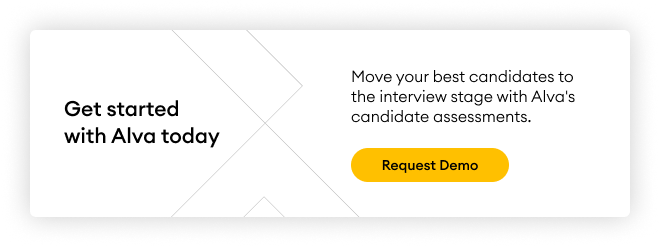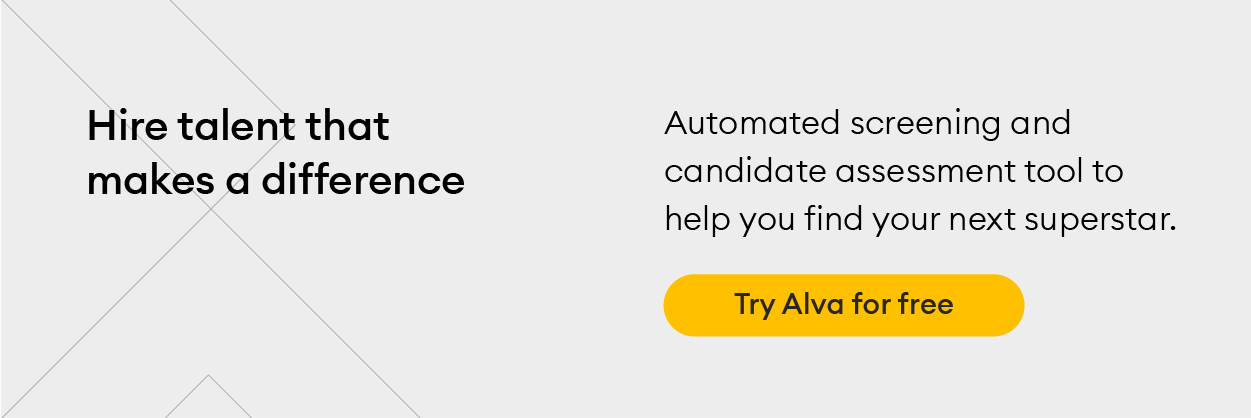Recruitment assessment tools have been around for centuries. During the Han Dynasty, Chinese imperial leaders used them to assess knowledge, intellect, and moral integrity when choosing civil servants. Throughout World War I, the US and Europe applied modern personality and intelligence tests to their military recruitment process, helping them pick military personnel.
Today, companies use recruitment assessment tools to screen candidates and assess them for various factors like competence, personality, potential and emotional intelligence. Research shows that pre-employment tests for such traits are much better performance predictors than years of experience or education—the type of data typically highlighted in CVs and cover letters.
Let’s unpack four reasons you should consider a recruitment assessment tool for your business.
Why consider a recruitment assessment tool?
Over 62% of employers use pre-hire assessments to help hiring managers make better recruiting decisions. Here’s why you should consider doing the same:
Improve the quality of hires
Unless you’re using a structured hiring process, deviating from job-specific criteria when assessing candidates is easy. This is especially true when it comes to screening candidates using CVs. A foreign-sounding CV name results in a 50% lower likelihood of being invited for an interview. CVs further lead us to overestimate historical merits, such as education and years of experience - data points that have shown a very weak correlation with how one performs at work.
Pre-hire tests, on the other hand, can be designed to focus solely on the competencies that matter for the job, helping companies to objectively determine the extent to which a candidate has the knowledge, skills, and abilities to perform well on the job.
Boost your hiring efficiency
It typically takes about 45 days to fill a new position. But if you already have hundreds of candidates in the applicant pool, it can be time-consuming to sift through the piles of CVs only to pick out a few candidates that stand out.
That’s what Daniel Wellington experienced in 2019. Due to its brand promise, the Swedish watch and accessory giant enjoyed a steady stream of applications for open roles. However, for the talent acquisition team, that translated to hours spent weeding through hundreds of applications. When Daniel Wellington engaged Alva Labs, they were looking to solve a core pain: high-volume hiring without sacrificing on the quality of hires.
After applying Alva’s candidate assessment platform—which included a logic and personality test— the time spent initially screening CVs was redirected to the interview stage, enabling hiring managers to determine role fit and progress with candidates much faster.
Ultimately, pre-hire tests can limit the hours spent on tedious tasks, making the process of spotting suitable candidates with the most potential for success on the job much quicker.
Make your hiring process more objective
It’s no secret that unstructured interviews, CV screenings, and pre-interview calls are low predictors of job performance. This is because recruiters and hiring managers often judge candidates based on subjective gut feeling rather than role-related criteria.
Recruitment assessments work differently. If they’re scientifically developed, they can help you draw more objective conclusions about your candidates. Well-designed tests are valid (they measure what they are designed to measure) and reliable (they produce consistent results). When standardised, these tests give everyone the same opportunity to succeed.
When to use different types of recruitment assessments
Many types of recruitment assessment tools are on the market, each tailored to a specific use case. Let’s take a look at some examples.
Skills-based assessments
Skills-based assessments measure a candidate’s technical skills and theoretical expertise in a particular field. For example, a developer may be asked to code via a live coding interview or a take-home assignment. Similarly, a copywriter may be asked to develop a creative copywriting strategy in a case assignment. These skills-based tests are most useful for jobs requiring specialised knowledge or high levels of expertise.
Cons: A skills-based test doesn’t factor in traits like learning ability. A candidate may code in a language different than you desire but be a quick learner. A copywriter may be great at producing landing page copy that converts but be slow at soaking up new knowledge or ideas. This is why skills-based assessments should be combined with other evaluation methods to get a full picture of the candidate’s abilities and potential.
Personality test
Personality tests offer a sneak peek into the candidate’s personality traits and broad abilities, helping employers form a data-driven perception of who has the talent, motivation and soft skills to succeed in a specific role. While there are many personality tests on the market, the Big Five Personality test is known as the gold standard model for understanding and capturing personality. Extensive studies have shown that when used correctly, this type of personality test has a strong ability to identify candidates with promising prospects not only to perform but also to develop forward.
Cons: People tend to answer based on what they think you want to hear and may misrepresent themselves. Meanwhile, some candidates may find personality tests intrusive, which could harm the candidate experience. This is why it’s important to pick a reliable personality test provider that is quick to complete and candidate-friendly.
Logic test
Logic ability tests measure a candidate’s general mental abilities, which strongly correlate to job performance. In fact, logic tests have shown to be the single assessment tool that can best predict future job performance. Alva’s logic test is a non-verbal, matrix reasoning test, a format widely used in both research and practice. The format is particularly useful since it minimises the role of previous knowledge and experience, instead focusing on the candidate’s ability to identify patterns and relationships in material. The extent to which a person can solve patterns indicates their capability to solve tasks containing complex or incomplete information.
Cons: As with any cognitive ability test, practice can improve test takers’ scores. Also, certain people may experience the tests differently, including neurodivergent people, so it’s important to use multiple evaluation methods and not base hiring decisions exclusively on these tests alone. The best way to use these tests is as a reference guide.
Interview tool
Structured Interviews are one of the most important processes for any recruiter looking to decrease bias, as they allow a horizontal analysis of candidates’ answers. Jens Engrund, Talent Manager at Teledyne FLIR, uses early-stage assessments to allow Hiring Managers to build candidate profiles that are based on potential, core skills and readiness. Jens uses psychometric data in preparation for interviews, then adds data from objective, skills-based interview questions.
This transparent decision-making process is simple for both Hiring Manager and recruiter to understand how and why decisions are made.
Cons: If you want to go off-script throughout the interview, structured interviews may be perceived as too rigid, as they follow a certain scoring system and limit the interviewer's ability to probe, clarify or explore additional topics.
Why psychometric assessments are the best screening option
A psychometric assessment (also known as a psychometric test) consists of a set of questions that measure the extent to which a candidate’s personality and logical ability match those required to perform a job. When designed objectively, psychometric tests are an effective tool for hiring managers to understand a candidate’s potential and natural abilities.
For example, imagine you’re hiring an SDR. One of your candidates scores highly in the competency areas like adaptability, social skills, decisiveness, and leadership. Knowing this can inform how you encourage, nurture and develop your employees to fulfil their potential and hopefully grow in the organisation.
When selecting a psychometric assessment vendor, you must consider the following:
- ✅ Objective - how objective is the scoring system? The score must be unaffected by the assessor's beliefs or values
- ✅ Standardised - Are the tests consistent and administered under controlled conditions?
- ✅ Reliable - What’s the margin for error?
- ✅ Predictive - How accurately do the tests predict performance?
- ✅ Non-discriminatory - Are the tests biased to certain groups?
Alva’s psychometric assessment platform
Our psychometrician team has created three industry-leading candidate assessments: logic and personality and bespoke coding tests for developers. All of our tests take under 30 minutes to complete, and candidates have instant access to their results, which are identical to those seen by their prospective employer. Candidates can also use their test results for multiple job applications, saving them time and effort in what is typically a needlessly arduous hiring process.
Convenience store and gas chain Circle K, use Alva to streamline their hiring and improve their candidate experience.
Selecting the right recruitment assessment tool: key considerations
What should you factor in when picking a pre-employment assessment tool? Below we outline key considerations to take into account.
Data Analytics and AI Integration:
Consider assessment tools that leverage data analytics and AI capabilities to provide insights into candidate performance and potential. These tools can analyse results, compare them against benchmarks, and provide data-enabled recommendations. Look for tools that use machine learning algorithms to improve their assessments' accuracy and predictive power.
User-friendliness of platform
Whatever platform you opt for, make sure it’s user-friendly and provides an intuitive experience for candidates and hiring managers. You want to reduce friction throughout the recruitment process, not increase it! Features to watch out for include easy administration of assessments (including test time), clear instructions for candidates, and an easy reporting system for hiring managers.
Integration with Applicant Tracking System (ATS):
Look for assessment tools that integrate seamlessly with your existing ATS or recruitment technology stack. This integration enables a smooth flow of data and assessment results, streamlining the evaluation process and reducing manual effort for your hiring managers.
Vendor support and training:
Consider the level of support and training provided by the assessment tool vendors. Look for vendors that offer comprehensive onboarding, training resources, and ongoing customer care support to ensure successful implementation and adoption of the assessments within your talent acquisition team.
Reliability of tool
How accurately can the results predict employee performance on the job? And how do the test results measure up against similar tests measuring similar criteria? With your ideal tool, the answer to all three should be 'yes,' Ask the tool provider about the scientific validity behind the test and request proofs as and where relevant.
Seven steps to choosing the right recruitment assessment tool
#1 Identify your hiring pains
What do you want to improve? Time to hire? Quality of hires? Employee turnover? Or candidate satisfaction, maybe? Defining your objectives will enable you to narrow your focus and pick an assessment vendor that tackles your core pain.
#2 Research available tools
After scoping out your hiring pains and getting alignment from the C-suite, research the available tools. Read reviews, compare features, and consider factors like the tool’s reputation, customer support, and pricing when narrowing down your list.
#3 Evaluate features
If you've shortlisted some assessment tool providers, evaluate them based on their experience, credibility, and customer feedback. Check if they have worked with companies similar to yours and how successful their implementations have been.
#4 Assessment validity and reliability
Companies that use a scientific assessment tool to select the top candidates report a 59% less turnover rate and 21% higher profitability rate. Picking the right tool is key. Look for evidence of the tool's effectiveness and accuracy in predicting job performance and read through testimonials and reviews to get a sense of the tool’s credibility. Avoid tools that lack proper research or statistical data to support their claims.
#5 Data security
Ensure the assessment provider provider follows data protection standards and complies with relevant regulations (e.g., GDPR). Safeguarding candidate information is crucial to maintain trust and avoid legal issues.
#6 Consider ROI
Consider the cost of the tool in relation to the return on investment before making a decision.
Purchasing a pre-employment assessment tool costs a considerable amount of money. Is the money you expect to save on less turnover or decreased time to hire going to be worth the investment?
#7 Try out the product
Consider requesting demos or trials of the assessment tools you are interested in to get hands-on experience and assess how well they fit your requirements. Furthermore, involving key stakeholders, such as hiring managers and HR professionals, in the evaluation process can help gather diverse perspectives and make an informed decision.
Checklist to vetting your assessment vendor
- ✅ Length- how long is the assessment?
- ✅ Artificial intelligence- how does your assessment measure artificial intelligence?
- ✅ Adverse impact- how do you ensure your assessments are fair?
- ✅ Content- what content validation process have you implemented?
- ✅ Impact/validity-how does your assessment predict success in the role?
- ✅ Ongoing support- how do you ensure your assessment stays updated and relevant?
Find the right recruitment assessment tool for your company
Pre-hire assessments can be a powerful tool for organisations looking to make data-driven hiring decisions.
With Alva, hiring the best people is no longer a question of gut feeling. Alva’s digital hiring platform helps recruiters objectively qualify and compare job candidates with psychometric testing. Its tests, created by a team of psyshometricians, data scientists and talent acquisition experts, combine AI and machine learning with leading psychometrics and organisational psychology.
Companies who use Alva Labs report a:
➡️ 95% hiring success rate
➡️ 60% reduction in time to hire
➡️ 80% candidate satisfaction rate in completing the tests







